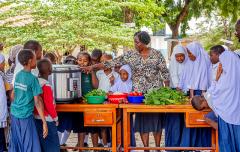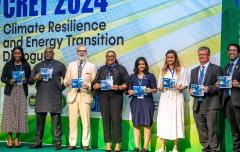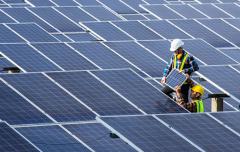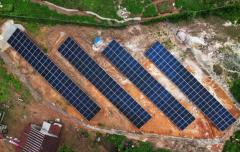Clean Cooking Takes Off in Schools with First eCooking Kitchen Launch in Tanzania
Dar es Salaam, Tanzania – 22 July 2025 – Sustainable Energy for All (SEforALL), the World Food Programme (WFP), in partnership with the Government of Tanzania, with support from UKAid - Modern Energy Cooking Services (MECS)launched the Kibasila eCooking Model Kitchen. The pilot school, Kibasila Primary School, has been successfully equipped and refurbished with modern cooking systems, laying the groundwork for scale-up across other schools in Tanzania.
The unveiling of the Kibasila eCooking Model Kitchen marked the inauguration of the Accelerating Clean Cooking Transition in Schools in Tanzania initiative, a bold step forward in tackling the health, gender and environmental impacts of traditional cooking methods often used in school meal programs.
Kibasila Primary School is the first to be fully equipped and refurbished with modern electric cooking infrastructure under the partnership initiative, piloting in Tanzania. It sets the precedent for the roll-out of clean cooking technology in up to 50 government schools across Tanzania in 2025.
The newly equipped kitchen features a set of electric pressure cookers (EPCs) - including one 45-litre EPC, two 65-litre EPCs, and one 80-litre EPC - allowing for faster, cleaner, and more energy-efficient meal preparation. The retrofit also included comprehensive infrastructure upgrades such as the installation of a new electricity meter with proper grounding, complete re-wiring to support high-efficiency appliances, a water connection, and significant enhancements to hygiene and safety. The cooking space now features tiled floors and walls, two countertops, two sinks, new lighting, and four ceiling fans to ensure a comfortable working environment. The adjacent storage room was also refurbished to allow for both cooling and safe food storage.
Schools, due to the high volume of meals prepared daily, are among the largest consumers of biomass energy – second only to households. Over 400 million children around the world currently receive at least one meal a day at school. In sub-Saharan Africa, many of these meals are prepared using biomass stoves, which can place additional responsibilities on families and children, such as collecting firewood , and create an economic burden.
Transitioning to clean cooking in schools promises to deliver far-reaching health, environmental, and educational benefits. It reduces indoor air pollution, lowers greenhouse gas emissions, and strengthens school infrastructure, while also improving the health and working conditions of cooks and enabling more consistent, efficient meal delivery for students.
The successful launch of the Kibasila eCooking Model Kitchen represents a pivotal milestone in the clean cooking transition in schools, and the broader movement to ensure that every child is provided a meal that is cooked safely and reliably. As the initiative moves forward, it will not only support national policy goals on energy, climate, health, and education but also position Tanzania as a champion of clean cooking.
Quotes
“Transitioning to clean cooking requires a transformation. It begins with a change in mindset. Today at Kibasila, we are setting the springboard, where now we can jump to reach Tanzania’s national goal of 80% access by 203. We are therefore happy to collaborate with you (Sustainable Energy for All and the World Food Programme) on accelerating the clean cooking transition in schools.”
— Prof. Peter Lawrence Msoffe, Deputy Permanent Secretary, Vice President’s Office (Environment), the United Republic of Tanzania
“The UK is proud to support Tanzania’s clean cooking ambitions through our Modern Energy Cooking Services programme. Schools like Kibasila are leading the way, showing that clean, affordable, and sustainable energy is not only possible, but essential for every community.
This initiative will help transform schools into hubs of energy transition, shaping mindsets, empowering youth, and protecting both people’s health and Tanzania’s forests.
We thank Sustainable Energy for All and the World Food Programme for their innovation and drive, as well as the Government of Tanzania, school communities, and all supporting organisations and partners working alongside us on this shared journey.”
— Marianne Young, British High Commissioner to Tanzania
“This is a showcase of the power of partnerships, demonstrating how electrification and clean cooking can work hand in hand using homegrown electricity to create pathways that simultaneously address energy, health, and gender equality goals. The joint initiative also delivers significant environmental benefits by protecting forests, reducing CO₂ emissions, and eliminating harmful black carbon.
Championing a future-focused approach that emphasises the critical role of youth in scaling this transformation, the program has welcomed 8 STEM trainees who will serve as future leaders in expanding clean cooking access across Tanzania.”
— Mikael Melin, Director of Partnerships and Development, SEforALL
“The Kibasila Modern eCooking kitchen showcases our vision for clean cooking in schools in Tanzania. More than a cooking space for the school, it will serve as a hands-on learning facility for schools across the country - equipping school management and cooks with skills and knowledge needed to adopt electric cooking technologies. This initiative is an important step forward in raising awareness and building capacity required to scale up clean cooking solutions across the country.”
— Ronald Tran Ba Huy, Country Director and Representative, WFP




